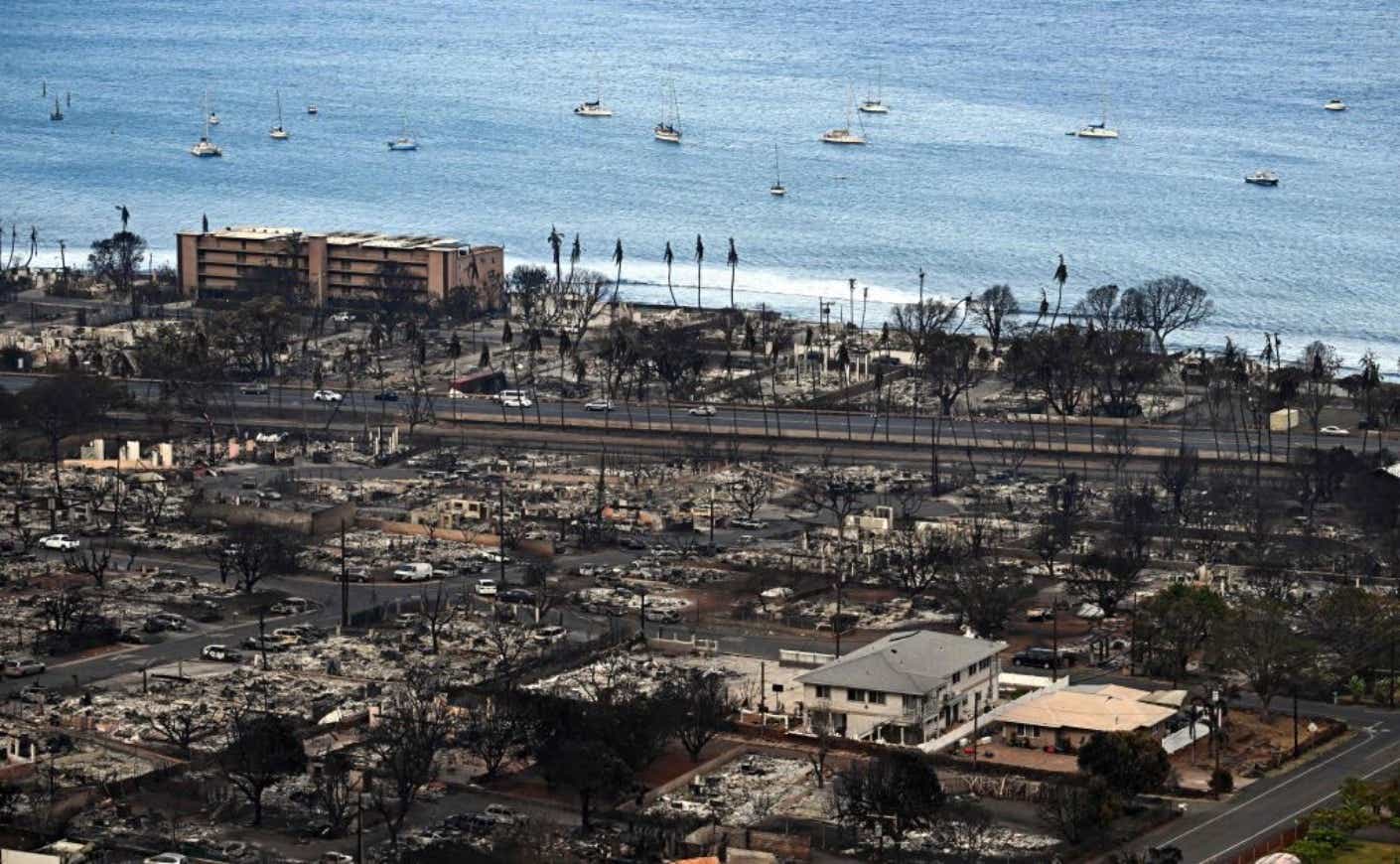The Hawaiian Island of Maui is grappling with the aftermath of wildfires that devastated much of the island last week. Hawaii Governor Josh Green said the fires were the “largest natural disaster in Hawaii state history,” and 80 percent of the once bustling beachfront town of Lahaina is now practically gone.
Amid ongoing rescue efforts, at least 115 people have been found dead. Sadly, the death toll is only expected to rise: Maui Police Chief John Pelletier said crews have covered 3 percent of the search area of an estimated 5 square miles. “We are in a period of mourning and loss,” Hawaii Sen. Mazie Hirono, said on CNN’s “State of the Union” Sunday after touring the catastrophe.
What’s worse is some say government agencies have blocked roads leading to the devastated areas, preventing vital food and water. “They’re just standing there and letting our families starve and not letting us help them,” Alexa Kailieha a locale to the area told NBC News.
There is a silver lining, though. The U.S. Coast Guard has saved 17 people in search and rescue missions around Lahaina as of Saturday, according to the Federal Emergency Management Agency.
Despite these challenges, there are some ways to help those left in the aftermath of the natural disaster. Here’s a look at how to help Maui residents now.
What we know about the Maui fires and their cause
The Maui blaze has already been declared the deadliest wildfire in the U.S. in more than 100 years.
The death toll on the Hawaiian island has surpassed the 2018 Camp Fire in northern California, which killed 85 people and destroyed the town of Paradise. A century earlier, the 1918 Cloquet fire killed 453 people in Minnesota, according to the National Fire Protection Association.
But what caused this natural disaster in the first place? Even though its exact cause remains unknown, experts believe it was largely fueled by a dry summer and strong winds from a passing hurricane, which caused flames to envelop the parched brush covering the island. “It outpaced anything firefighters could have done in the early hours,” U.S. Fire Administrator Lori Moore-Merrell said in a press conference.
Hawaiian Electric has become a focal point in the effort to determine just how the deadly wildfires in Maui — which have so far claimed at least 115 lives — got so out of hand. Lawyers representing Lahaina residents claim that the utility should have shut down power before high winds reached Maui, which chimes with what wildfire experts have said so far.
The Hawaii State Health Department meanwhile has warned that debris from the scorched buildings could carry toxic chemicals like asbestos and lead, posing long-term health risks to residents.
“Things like lead and asbestos are sort of top of the list. Those are things that are in paint, in buildings, and then do not really get destroyed with burning, so they’re now in the ash and the dust,” said Diana Felton, Hawaii’s state toxicologist per NBC News.
The island might not be in the clear just yet. Officials said that fire crews were battling some wildfire flare-ups in other parts of Maui, including the historic town of Lahaina, where at least 36 people died.
In response, Hawaii’s Attorney General Anne Lopez has opened a probe, saying her team is “committed to understanding the decisions that were made before and during the wildfires.”
How can you help those affected by the Hawaii wildfires?
Many of those impacted by the deadly fires have been left without a home or place to go, but there are some ways you can lend a helping hand.
First, there’s the Hawaii Community Foundation’s “Maui Strong” fund. According to its website, you can be sure that 100 percent of your dollars will go to “providing resources that can be deployed quickly, with a focus on rapid response and recovery.”
Meanwhile, the social services nonprofit Maui United Way has set up a Maui Fire and Disaster Relief Donations Page, where all donations are processed online. Giving back can even be as easy as sending a text to the American Red Cross with the word REDCROSS to 90999 (or if you prefer to dial, you can call 1-800-733-2767).
There’s also the nationwide charity Feeding America, which is working with food banks and community organizations on the ground to help feed survivors. (You can donate via its website, where you can enter a custom amount.) Even if you can’t afford to donate much, just know that every bit counts. The Maui Food Bank says it can provide four meals for every $1 donation.
Should you cancel your trip to Maui due to the fires?
With search efforts still underway, the Hawaiian government is strongly warning tourists not to go to Maui right now.
While most parts of Hawaii like Kauaʻi and Oʻahu continue to welcome visitors, the tourism authority said that those bound for West Maui in the coming weeks have been “encouraged to consider rescheduling their travel plans for a later time” to help conserve resources, such as available hotels and flights.
Celebrities, including Honolulu native Jason Momoa, have also encouraged vacationers to steer clear of the island. “Do not convince yourself that your presence is needed on an island that is suffering this deeply,” he wrote on Instagram.
If you’ve already booked your flight, then you might be able to change it, depending on where you bought your tickets from. For instance, United Airlines will allow you to cancel or get a refund if you paid for a flight to Hawaii between Aug. 11 and Aug. 31, while Hawaiian Airlines says customers to cancel their trip in exchange for a refund or a credit for future flights.
Alaska Airlines, United Airlines, Southwest Airlines, American Airlines, and Air Canada are also offering flexible cancellations or exemptions because of the fires, according to the New York Times. So take a deep breath and call your airline to see what their policy entails for the unfortunate disaster.









